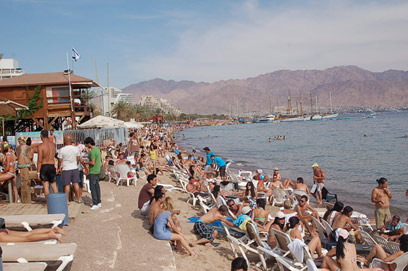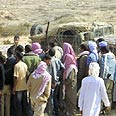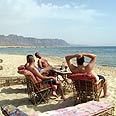Egypt is beefing up security on its border with Israel to prevent illegal crossings after detaining a group Cairo said were linked to Hizbullah, an enemy of the Jewish state, security sources said on Tuesday.
Egypt is holding 25 Egyptian, Palestinian, Sudanese and Lebanese men linked to Lebanon's Shiite Hizbullah group and has said they were planning attacks in Egypt, according to a statement from the public prosecutor's office.
Earlier reports said Egypt detained 49 people. But the prosecutor's statement, addressed to parliament and obtained by Reuters, said 25 out of 49 on a wanted list were held. State media said the group wanted to target Israelis and Egyptians.
Hizbullah, which has accused Egypt of failing to help Palestinians in Gaza, said one its members was detained and he was being helped by up to 10 others. Hizbullah said the group aimed to send military supplies to Gaza not target Egypt.
The arrests have been accompanied by a barrage of criticism of Hizbullah by newspapers in Egypt, which is majority Sunni and the first Arab state to sign a peace treaty with Israel.
"The number of Egyptian security patrols has been increased along the borders with Israel and police checkpoints near the border have been reinforced with additional police," one security source said.
A lawyer for some of the men, Abdel Moniem Abdel Maqsoud, said that one of his clients told investigators he had been involved in assisting Palestinians planning to infiltrate Israel to carry out attacks.
Popular tourist destination
Egypt's Sinai Peninsula is a popular tourist destination for Israelis and Egyptian media have suggested the group aimed to target resorts frequented by Israelis.
The security source said new barriers had been set up along some of the mountainous paths near the border and Bedouin tribal elders had been asked to report any strangers in the area.
Israeli newspapers said the Israeli army planned to boost border security but a military spokesman would not confirm this.
Security sources said police were combing Sinai in search of men wanted in connection with the group of 49, focusing on the mountainous areas frequented by smugglers. One source said police were searching for 10 Lebanese and three Sudanese men.
The sources said Bedouin tribesmen, angry at raids in their area, had exchanged fire with police but no one was injured.
Tensions with north Sinai Bedouin have never entirely subsided since Egyptian police detained thousands of young Sinai men several years ago after a series of bombings shook south Sinai's tourist resorts. Most were later freed without charge.
100% occupancy in Eilat
Sources at the Taba border reported Tuesday of only several thousands of Israelis arriving at the Sinai Peninsula during Passover, most of them Arabs, compared to past holiday seasons which saw tens of thousands of Israelis flock to the area.
Most Israelis decided not to travel to Sinai due to the concrete warnings of terror attacks and the search for terrorists. The other side of the border, however, remained crowded, with hotels in the resort town of Eilat reporting 100% occupancy.
According to figures collected at the Taba terminal, there are currently between 250 to 350 Israeli Jews and thousands of Israeli Arabs in Sinai.
"Statistically speaking, it's scarier in Tel Aviv," an Israeli woman who crossed the border with her three children told Ynet this week.

Crowded Eilat beach (Photo: Yossi Dos-Santos)
The Eilat Police is prepared to guard the tens of thousands of visitors. Chief Superintendent Eitan Gadasi, deputy commander of the Eilat Police, told Ynet that "the Eilat District is prepared as always to protect the many guests. The city is full, and the occupancy at the hotels and beaches is high."
According to Gadasi, "Eilat has been declared a city under threat since the terror attack in January 2007, and therefore the security deployment around and within the city is maximal all year, particularly during the holidays. We are deployed in all recreation centers on the beaches and there is complete and tight cooperation between all emergency elements in the city."
Eilat Mayor Meir Yitzhak Halevi believes that the security situation has no effect on his city's popularity. "The warnings about Sinai and the affair with Turkey are not the reason. The main reason is the city's attractiveness. We are usually full on holidays like Pesach, and this holiday we're particularly full… I assume that the number of visitors in Sinai is particularly small, and some are in Eilat."
According to Yossi Ani, director-general of the city's Underwater Observatory, the former director of the Red Sea Resort Tourism Association, the security dangers have led to a rise in the number of visitors who choose to sleep on the beaches with tents and sleeping bags. He agrees, however, that the audience traveling to Sinai is not the same audience which visits Eilat.
"In the past, marketing efforts were made to compete with Sinai after terror attacks, and we reached the conclusion that a high percentage of the Israeli tourists travelling to Sinai will not come to Eilat in any case," he says.
Tal Rabinovsky contributed to this report

















